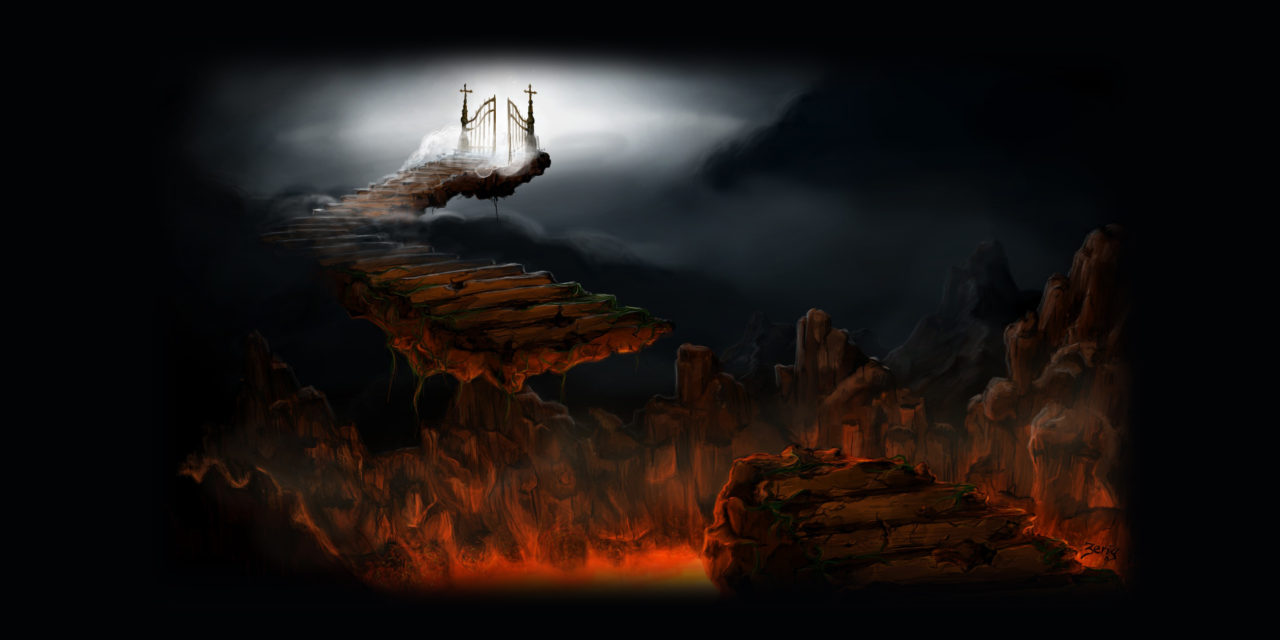When I was young, I went to church every Sunday with my grandparents. On some Sundays, we didn’t go to the “upstairs mass” because guitar music was being played at that mass, and my grandpa was NOT a fan. So instead of being in the main area of the church with all of the stunning stained glass, statues, ornately painted ceilings and beautifully carved pews with padded kneelers, we were in the basement, at the “downstairs mass”, with low ceilings, tight benches and uncomfortable, unpadded kneelers. On one particular Sunday in that downstairs mass, our priest recounted The Parable of the Onion in his sermon. It stuck with me then and still does today. So maybe it’s good that we were in the basement with nothing to distract my short, young attention span away from the sermon?
If you’re not familiar with it, The Parable of the Onion (as it was told to me) is about a selfish old woman who finds herself in Hell. She’s certain that she doesn’t belong there and begs for a chance to spend eternity in Heaven. She is given the opportunity to point to one altruistic thing that she had done in her life. She ultimately remembers a single kind act. She had once given a beggar an onion. That onion becomes her chance at salvation.

As the story goes, God reaches down from the heavens and extends this onion to her. She grabs it and God begins to lift her from Hell with it. As she’s lifted, others in Hell see her ascending and they grab on to her waist and legs and they begin to be lifted along with her. Others quickly see what is happening and they grab on as well – knowing that this is their chance to escape Hell. Soon there is a long chain of people who are all being lifted from Hell. No matter how many people grab on and how much weight is added to the chain, the onion remains strong and continues to lift them all – that is, until the old woman notices how many people are clinging on to her and her one good deed.
The old woman begins to worry that the onion won’t be strong enough to hold all of the extra weight. She also becomes angry because she feels that the people who are clinging on haven’t done anything to deserve to be lifted. She doesn’t want them to spoil her chances of being lifted to Heaven, and she especially doesn’t want them to benefit from something nice that she did. So she starts kicking and trying to shake them off. As people begin to fall off of the human chain, the onion becomes weaker and it starts to fray. This only makes her kick harder to try to shake off the extra weight of these “undeserving” souls. As more people fall off, the onion continues to fray more and more. As the old woman almost reaches Heaven, she finally kicks off the last remaining person. When he loses his grip on her, the onion snaps and the old woman plummets back down to Hell along with the rest of the souls who she refused to take with her.
As a child, I initially thought the moral of that story was, “Make sure to do a kind act that involves something with a strong handle or a safety harness – that way, you won’t accidentally fall off if you happen to find yourself in Hell and you’re being lifted up to Heaven.” After I thought more about it, I realized that this was NOT the moral of the story at all. The story really just illustrates how a single selfless act, no matter how small, can lift so many – if only we allow it. However, if we judge those who are being lifted along with us and get angry because we feel that they might not deserve to be lifted, we ultimately only hurt ourselves. In short, we can only help ourselves by helping each other or by allowing others to be helped without judgement. Even as child, I was able to understand this.
Unfortunately, many people don’t see it this way. They choose to cling to a stinky, shriveled onion in the form of hateful rhetoric. They cling to divisiveness that convinces them that they will be elevated if they help to shake off the “undeserving” – the people who are “clinging on”, the “takers”. They fail to see that we are strengthened when we stand together, not when we judge each other’s worthiness and knock each other down. As long as some people keep hearing that they can have more if they help to cast off the undeserving of our society, they are happy to do exactly that – without fully considering the consequences.
Sometimes the feeling of ascent is an illusion. You may not be rising. You may just be watching others fall. As we allow more and more people to fall (through our actions, or our inactions), it’s not helping any of us to rise. It’s only bringing us all closer and closer to the point where the onion is ready to snap.


I really like and appreciate your post. Thanks Again. Cool. Deb Talbert Fidelas